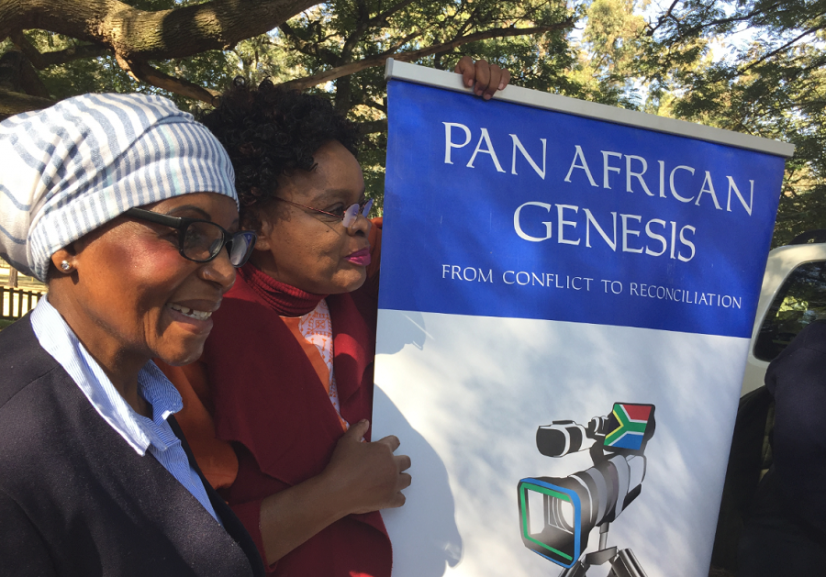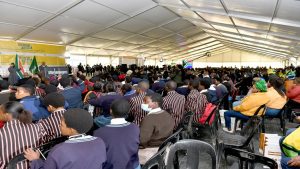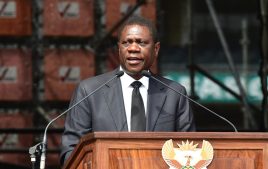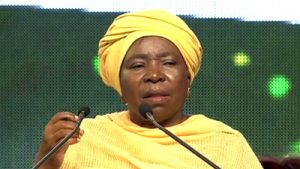A group of military veterans has taken it upon themselves to teach the youth about “the truth” of June 16 and the country’s history.
The group from Pan African Genesis say the youth must be told the truth about South African history and not just the facts.
“The fact is Hector Peterson was killed. The fact is it happened on that day [June 16, 1976], but what you don’t hear about is how it penetrates into the young minds. People must know the truth about June 16, not just the facts,” says Sibongile Promise Khumalo from Pan African Genesis.
Khumalo is a military veteran who went into exile when she was just 14 and half years old.
“They [government] are not telling them the truth of what happened on June 16 and those who left the country,” says Khumalo.
She and some of her peers on Wednesday brought together groups of pupils from different schools around the Midrand area to sit with them around a fire and tell them about “the truth” of South African history.
“We call it a braai site chat, like in the olden days when our great great grandfathers used to sit us outside. They would tell us stories that had value, not what you see on soapies. They would tell us real stories, how things are done and share their indigenous knowledge,” says Khumalo.
One of the military veterans, Thandi Monareng shared with the pupils the story of their first few days in exile and how were caught in the border between South Africa and Swaziland and taken to jail, three jails. Eventually they were freed and went to Mozambique. There their trauma continued because they were taken to a camp where many of the people did not have legs because they had walked on land mines. Many of them were in wheel chairs.
While Monareng narrates the story of being in a camp full of legless people, Khumalo adds in her the story of when she had her periods for the first time.
“When I saw the ocean in Mozambique, I had my periods for the first time because I had never seen so much water. I am from Soweto, I had never seen the ocean,” says Khumalo. She says the shock of seeing so much water for the first time proved to be too much for an already traumatised 14-year-old girl.
But not having your mother to walk you through your first period, being surrounded by legless people, being taken to jail and eating worm infested oats from Russsia was only the beginning of years of pain and hardship. Being a young person in exile was hard, being a young woman made it worse. Khumalo was later raped in one of the camps.
She says rape and sexual molestation was something that happened to many young women.
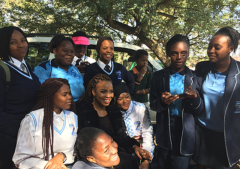
When the apartheid regime was eventually defeated, Khumalo says she had a lot of expectation but what she sees in the country now is not what she expected.
“I came back with a lot of anger but I’m not angry anymore, the anger that I have is towards our government, they way they are treating our youths,” says Khumalo.
Some of the pupils at the braai side chat are from Dr. Mathole Motshekga Primary. When asked who that is, they do not know.
Khumalo says this makes her angry and is a clear indication that the government is failing to properly educate learners.
“It’s like the people the streets are named after, we know them because they took care of us in exile but these kids have no idea who it is,” says Khumalo.
Khumalo’s daughter, popular TV and radio host, Masechaba Ndlovu also spoke at the event. She spoke to the young people about being born in exile and not knowing home until she was much older. She urged them to live their lives with the courage their 1976 peers had.
“The most important thing you can get is the courage and bravery that your peers in 1976 had. Going to another country knowing very well that there are many who were killed trying to do what you want to do and yet still being brave enough to say, I will be part of the change, I have a voice, I can make a difference, I have power,” says Ndlovu.
One of the pupils who was at the event, Khodani Mulaudzi says the event opened her eyes to the realities of being in exile and just how many people fought for freedom but are never spoken about. “I have learned that there are so many people who fought for our freedom but they are not recognised because people only know of Nelson Mandela and Walter Sisulu and all those people but if we go deeper, we find they are a lot of people who actually did more than what the well-known people have done,” says Mulaudzi.
She says she has decided to do her own research of the country’s history instead of depending on what she learns at school and the media tell her.


